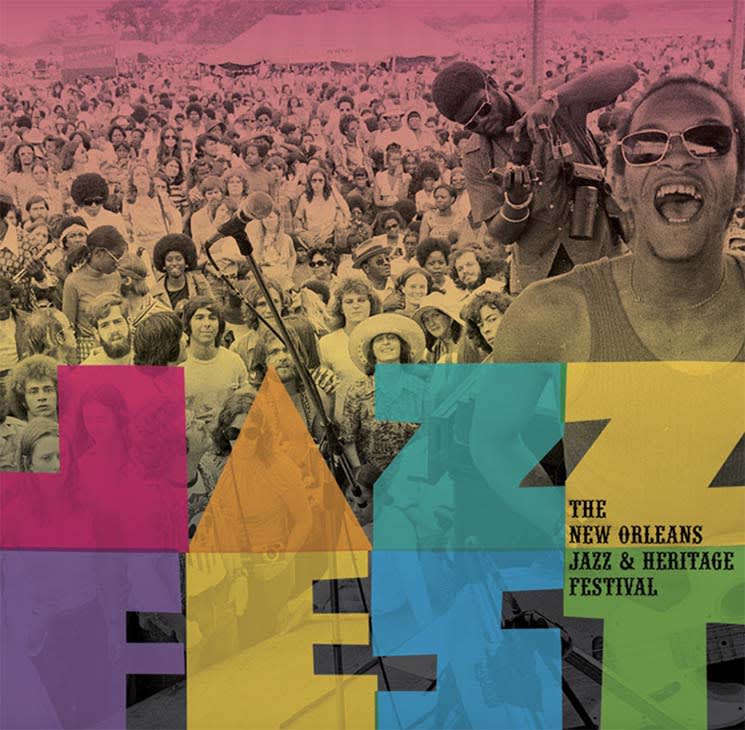Listening to this new box set of 50 years of performances from the New Orleans Jazz & Heritage Festival (by Smithsonian Folkways), three really fascinating arguments start to form: that any music made in New Orleans for citizens of New Orleans could be considered jazz (funk, bounce, zydeco, doo-wop or blues, here are read as jazz); that New Orleans gave birth to American music, starting with jazz; and that jazz is still a populist American art form, because of its city of origin.
These arguments provide delightfully small counterfactuals, where the national anthem is the Dixie Cups "Iko Iko"(a perfect song to dance to, one whose lyrics are impenetrable outside of New Orleans, has a chorus is meant to be yelled over any brass band, and whose rhythmic section has a ruthless cadence); the Meters are world famous (and dammit they should be); and Big Freedia's bounce is the place where all of this trap beat ubiquity started. (The dense angularity of the bounce beat can be understood in the complex doubling, sped up into a corporeal oblivion.)
This argument provides some genuinely complex moments. On John Boutté's cover of Randy Newman's "Louisiana 1927" Boutté adds a mournful horn solo, a call-and-response choir, and a chorus that talks about the floods in the Lower 9, decades after 1927. This cover strips Newman's irony; though Newman is from Louisiana, Boutté comes from a family that has played music for funerals for generations. Boutté's act of public mourning for a devastated community feels local in the angriest, most heartfelt way.
There are other examples of this: Germaine Bazzle and Red Tyler Quintet's almost nine-minute reworking of the Doris Day camp classic "Secret Love" has a whole history of queer assignations and quietly burning desire within its subtle vocal tricks and elegantly brushed drums. Clarence "Gatemouth" Brown removes Duke Ellington's "Take the A Train" out of the cool sophistication of New York, syncopating piano at an almost feverish rate; and the Original Liberty Jazz Band has a version of "Summertime" that swings with almost tropical heat. All of these songs, all of these versions, act as a kind of homecoming for jazz.
The album is a set of complex arguments — what home means and what genre means are issues that will never quite settle — and though the tracks work to a kind of traditional space, the hours that the music contains are not only a history of the New Orleans Jazz Festival event, but of jazz as a genre and of New Orleans as a city. There are small places to quibble — I would like more hip-hop, especially the 30 years of bounce, which is represented here solely by Big Freedia, but those are very minor concerns. One is convinced by the arguments it makes.
(Smithsonian Folkways)These arguments provide delightfully small counterfactuals, where the national anthem is the Dixie Cups "Iko Iko"(a perfect song to dance to, one whose lyrics are impenetrable outside of New Orleans, has a chorus is meant to be yelled over any brass band, and whose rhythmic section has a ruthless cadence); the Meters are world famous (and dammit they should be); and Big Freedia's bounce is the place where all of this trap beat ubiquity started. (The dense angularity of the bounce beat can be understood in the complex doubling, sped up into a corporeal oblivion.)
This argument provides some genuinely complex moments. On John Boutté's cover of Randy Newman's "Louisiana 1927" Boutté adds a mournful horn solo, a call-and-response choir, and a chorus that talks about the floods in the Lower 9, decades after 1927. This cover strips Newman's irony; though Newman is from Louisiana, Boutté comes from a family that has played music for funerals for generations. Boutté's act of public mourning for a devastated community feels local in the angriest, most heartfelt way.
There are other examples of this: Germaine Bazzle and Red Tyler Quintet's almost nine-minute reworking of the Doris Day camp classic "Secret Love" has a whole history of queer assignations and quietly burning desire within its subtle vocal tricks and elegantly brushed drums. Clarence "Gatemouth" Brown removes Duke Ellington's "Take the A Train" out of the cool sophistication of New York, syncopating piano at an almost feverish rate; and the Original Liberty Jazz Band has a version of "Summertime" that swings with almost tropical heat. All of these songs, all of these versions, act as a kind of homecoming for jazz.
The album is a set of complex arguments — what home means and what genre means are issues that will never quite settle — and though the tracks work to a kind of traditional space, the hours that the music contains are not only a history of the New Orleans Jazz Festival event, but of jazz as a genre and of New Orleans as a city. There are small places to quibble — I would like more hip-hop, especially the 30 years of bounce, which is represented here solely by Big Freedia, but those are very minor concerns. One is convinced by the arguments it makes.




